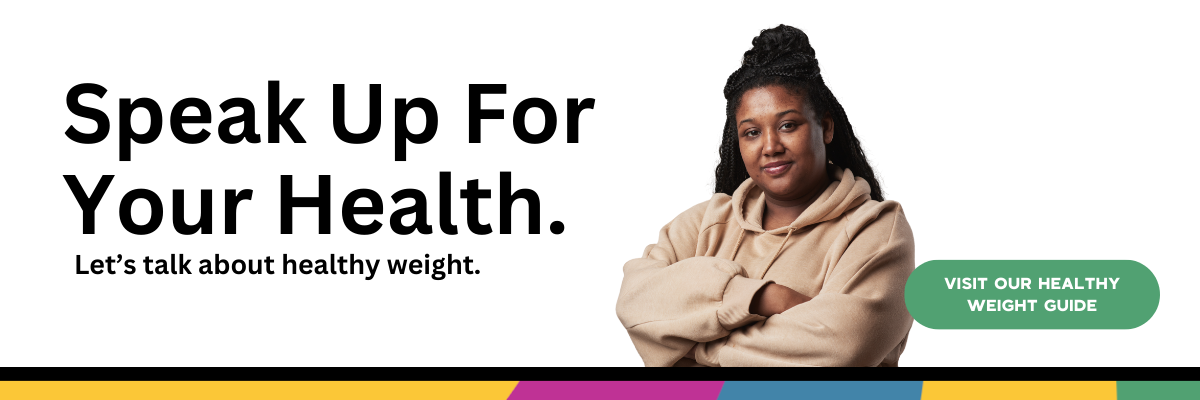When 32-year-old Brandon Browner passed out in the middle of the street one evening after work, he woke up in the intensive care unit. At nearly 300 pounds, his excess weight, in conjunction with a poor diet, had resulted in a severe health scare. When he arrived at the emergency room, his pressure was 196/100, which had also weakened his heart, leaving him at risk for a heart attack.
Many Black men don’t think being obese is a big deal. For them, it is not a fatal health condition like cancer or heart disease. But that is not true. Dr. Chika Anekwe, an obesity medicine physician at Massachusetts General Hospital, says research has found 195 diseases influenced by excess weight. While Black women have a higher obesity rate at nearly 55%, more than one-third of Black men, 36.9%, are also challenged by obesity.
Browner’s experience was a wake-up call. His condition was so severe the hospital would not release him for another three months.
During that time, he was forced to change his diet. “It was hospital food, so no salt, protein and vegetables, sugar-free applesauce. When I was first admitted to the hospital, I couldn’t wait to get out and eat some real food. But after spending so much time in that hospital bed, I’ll do whatever I can to never go back.”
Browner admits he doesn’t always adhere to his diet but has made profound lifestyle changes that have stuck.” I eat a lot more fruit and vegetables, go to the gym three times a week, and drink a lot more water. I never want to go through that again.”
Taking a Proactive Approach
While Browner’s health scare forced some changes, other Black men have seen the warning signs and decided to be proactive. Robert Thompson, 47, was motivated to make a change when, during his annual checkup, he noticed the scale was getting too close to 300 pounds. “While I cut off soda and sweets, the main factor was exercise. I started by going on long walks, which turned into working out with weights and runs. Just moving around more helped out a lot with my weight. I ended up going down to 220 pounds,” Thompson said.
“It’s the little changes that can help and you will see that they start to add up. What you eat matters too. You don’t have to cut out anything but you do have to consume less of it and add more beneficial calories,” Thompson explained.
The Impact of Pandemic Pounds
COVID-19 caused an uptick in obesity, especially in the black community. Rafael Mendez, 52, saw a rapid weight gain in just a few short months in 2020. “I work in an office, so I wasn’t physically active every day before the shut-down,” he said. “But being in the house and having 24-hour access to my kitchen did a number on me. It started with just light snacking during the day, and before I knew it, I ate a bowl of cereal every hour during the workday.” In three months, he gained 15 pounds.
Since Mendez couldn’t get to a gym, he needed to get innovative about exercise. “I started out taking walks on my lunch break, and eventually, I was able to turn walking into jogging. Then, I researched exercises I could do in my home or backyard. I also had to break the habit of eating all day. I found healthier snacks like rice cakes and pita chips. It took me a little while, but I was able to lose the weight I gained.”
Beware of Belly Fat
Brothers must also be aware of the dangers of excess fat around the abdominal area. We often consider it excess padding, limited to subcutaneous fat just below the skin. However, the fat that lies deeper in the abdomen can be more problematic. Visceral fat can surround their internal organs. The Mayo Clinic says it can contribute to the following conditions:
- High blood pressure.
- An unhealthy amount of fat in the blood.
- Sleep apnea.
- Heart disease.
- High blood sugar and diabetes.
- Certain cancers.
- Stroke.
- Fatty liver.
Making a Mindset Shift
So, how can we get our men to take obesity seriously? Florida A&M Nutrition professor Dr. Jenelle Robinson believes we must first change our thinking about eating healthier foods. “You need to get away from the word, ‘I’m on a diet’ and say, ‘this is my dietary lifestyle,'” said Robinson. “My dietary lifestyle is x, y, or z, and I live that way.”
Six Steps That Help Lead to a Healthier Lifestyle
Consult with your HCP About the Risks.
Not only should you consult with your physician, but you should consult with them about an action plan that is tailored to you specifically. A Journal of General Internal Medicine study found that some African Americans reported that it was only after they developed a condition such as diabetes or heart disease and their physician discussed the connection to their weight that they finally understood what their health risks were.
Talk With Your Village or Circle
Like many issues with black men, our obesity/ health is often an issue that we keep to ourselves. But people in our communities often deal with the same things as us. Having an open forum with each other can be mutually beneficial. What questions are you asking your doctor? What are some methods people around you are using to manage their weight?
Hire a Dietician or Nutritionist
Being healthy is not a one-size-fits-all type of deal. Everything needs to be personalized to your needs. One person may need to eat more fruits and vegetables, while another may need to incorporate more protein into their diet. Having a nutritionist tailor a diet that is right for you can help you reach your goals more quickly.
Work With a Personal Trainer
When it comes to weight loss, a healthy diet and exercise regimen go hand in hand. And just like dieting, exercise is not one size fits all. For example, if you have problems with your feet, running on the treadmill might not be ideal. Or if you have issues with your back, you may want to ease off doing heavy weightlifting. That’s why hiring a personal trainer is a great idea. Not only can they give you a personalized exercise regimen to help you reach your goals, but they can also give you tips on what foods you should be consuming for your body type and your nutritionist.
Team Up With An Accountability Partner
Goals are always more challenging to reach alone. So consider linking up with an accountability partner or perhaps a group of accountability partners. The journey to a healthier lifestyle had as much to do with your mental and physical health. Having an accountability partner gives you an outlet to express yourself. Share the challenges you are going through that have worked well and not so well. Sharing these things can help everyone reach their goals faster.
Set Realistic Goals
You didn’t gain the weight overnight, so you should not expect to lose the weight overnight. There is no microwave solution for weight loss, and if there is one out there, chances are it will not be sustainable over a long period. By setting unrealistic goals, you risk getting discouraged when you don’t reach them. Set attainable goals and crush them. Rome was not built in a day. Slow and steady wins the race. So pace yourself. You’ve got this!
Supported by an educational grant from Novo Nordisk Inc.






